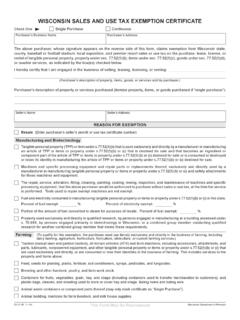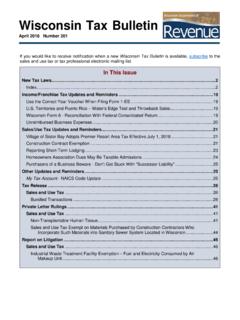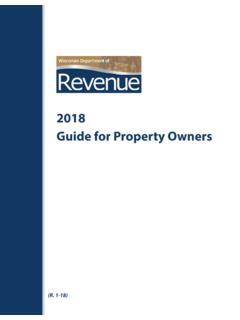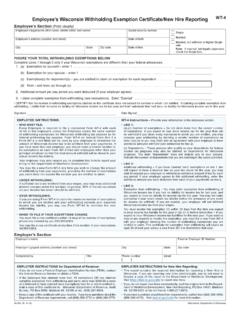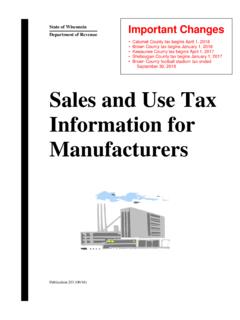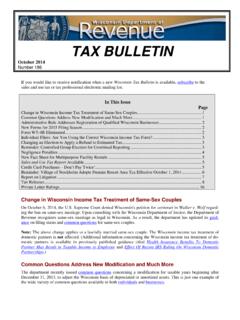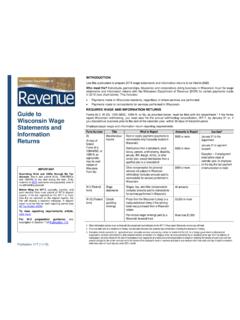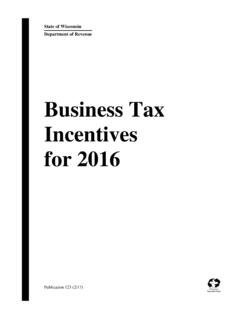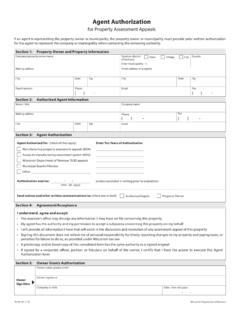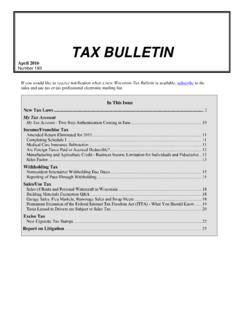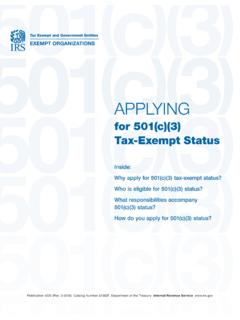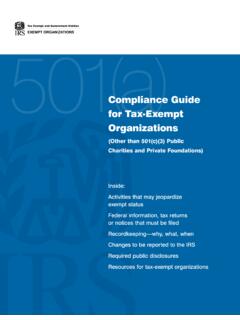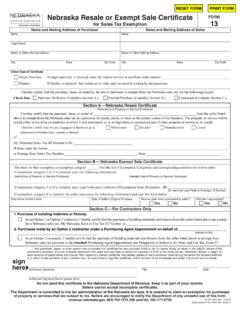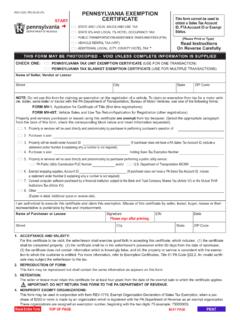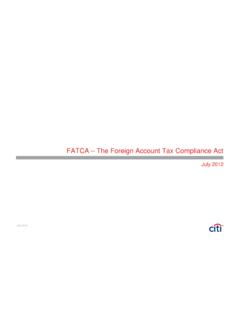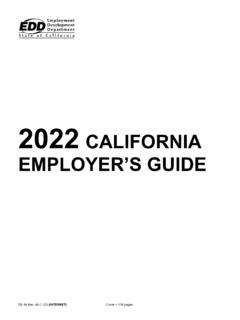Transcription of Update to Instructions as a Result of 2021 Wisconsin Act 1
1 IC-506 (R. 2-21) 1 Update to Instructions as a Result of 2021 Wisconsin Act 1 On February 18, 2021, Governor Tony Evers signed 2021 Wisconsin Act 1. The law provides the following changes to the 2020 tax year: Federal Paycheck Protection Programs Wisconsin adopted sections 276(a) and (b) and 278(a) of Division N of Public Law 116-260, regarding the tax treat-ment of income and expenses relating to the original and subsequent Paycheck Protection Programs (PPP). Tax-payers may exclude from income the forgiveness of debt on PPP loan proceeds and deduct expenses paid with PPP loan proceeds that are otherwise deductible. Other Federal Grants, Loans, and Subsidies Wisconsin adopted section 278(b), (c), and (d) of Division N of Public Law 116-260, regarding the tax treatment of income and expenses relating to certain federal grants, loans, and subsidies.
2 Taxpayers may exclude from income the following federal grants, forgivable loans, and subsidies, and deduct expenses paid with the funds if the expenses are otherwise deductible: Section 278(b) - Emergency grants of economic injury disaster loans (EIDL) and targeted EIDL advances Section 278(c) - Subsidy for certain loan payments Section 278(d) - Grants for shuttered venue operators Other Federal Provisions Adopted For an inclusive list of federal provisions adopted under 2021 Wisconsin Act 1, see the Provisions of the Internal Revenue Code Adopted section of these Instructions . State Grant Programs During the COVID-19 Pandemic The following income is exempt from Wisconsin income and franchise tax: Income received from the state of Wisconsin with money received from the coronavirus relief fund authorized under 42 USC 801 to be used for any of the following purposes.
3 O Grants to small businesses o A farm support program o Broadband expansion o Privately owned movie theater grants o A nonprofit grant program o A tourism grants program o A cultural organization grant program o Music and performance venue grants o Lodging industry grants o Low-income home energy assistance o A rental assistance program o Supplemental child care grants o A food insecurity initiative o Ethanol industry assistance o Wisconsin Eye Income received in the form of a grant issued by the Wisconsin Economic Development Corporation during and related to the COVID-19 pandemic under the ethnic minority emergency grant program. Income from these programs is included in federal income pursuant to sec. 61 of the Internal Revenue Code, unless an exception applies. For Wisconsin , this income should be excluded from federal adjusted gross income by making a subtraction modification on Form 6, Part II, line 4m, using Code 12.
4 Note: Expenses paid for with these programs and deducted in the computation of federal adjusted gross income are not required to be added back on the Wisconsin return. 2020 Form 6 Instructions for Combined Returns IC-506 (R. 2-21) 2 2020 Table of Contents Who Must File Form 6 .. 4 Types of Taxpayers .. 4 Doing Business in Wisconsin .. 4 entities Not Required to File .. 5 exempt entities .. 6 Franchise or Income Tax .. 6 Economic Development Surcharge .. 6 Separate Return or Combined Return? .. 7 Combined Returns and Groups in General .. 7 Test 1: Commonly Controlled Group .. 7 Test 2: Unitary Business .. 8 Test 3: Water s Edge .. 10 General Franchise or Income Tax Return Instructions .. 11 Who is the Designated Agent? .. 11 When and Where to File .. 11 Period Covered by Return .. 12 Accounting Methods and Elections .. 13 Payment of Estimated Tax.
5 14 Components of Combined Return .. 15 Required Disclosures and Information Returns .. 15 Internal Revenue Service Adjustments, Amended Returns, and Claims for Refund .. 16 Final Return .. 17 Penalties for Not Filing or Filing Incorrect Returns .. 18 Conformity with Internal Revenue Code and Exceptions .. 18 Provisions of the Internal Revenue Code Not Adopted by Wisconsin : .. 23 Other Exceptions to Internal Revenue Code .. 26 Depreciation and Bonus Depreciation .. 26 Section 179 Expense .. 26 Capital Losses .. 26 Limitations on Certain Federal Deductions .. 26 Federal Consolidated Return Regulations .. 27 Differences Between Federal and Wisconsin Basis of Assets .. 27 General Instructions for Apportionment .. 27 Who Must Use Apportionment .. 27 Apportionment Method .. 27 Nonapportionable Income .. 28 Separately Apportioned Income .. 29 Corporate Partners or LLC Members.
6 29 Separate Accounting .. 29 Treatment of Specialized Industries and entities .. 29 Foreign Sales Corporations (FSCs) .. 29 Interest Charge Domestic International Sales Corporations (IC-DISCs) .. 30 Insurance Companies .. 30 Personal Holding Companies .. 30 RICs, REMICs, REITs, and FASITs .. 30 Tax exempt Organizations .. 30 Urban Transit Companies .. 31 Line-by-Line Instructions for Form 6 .. 32 Page 1 .. 32 Page 2 .. 37 Part I: Modified Federal Taxable Income .. 41 Part II: Unitary Income Computation .. 45 Part III: Member's Share of Form 6 Items .. 62 Part IV: Wisconsin Net Business Loss Carryforward .. 68 Part V: Nonrefundable Credits .. 73 Part VI: Additional Member Information .. 77 2020 Form 6 Instructions for Combined Returns IC-506 (R. 2-21) 2 Required Attachments .. 81 Additional Information, Assistance, and Forms .. 81 Web Resources.
7 81 Contact Information .. 82 Obtaining Forms .. 82 IMPORTANT: Unless otherwise noted, every combined return must include the following supplemental forms/schedules in addition to Form 6: Schedule A-01, A-02, A-03, A-04, A-05, A-06, A-07, A-08, A-09, A-10, or A-11, for each member of the combined group Federal Form 1120, Corporation Income Tax Return, for each member of the Wisconsin combined group 2020 Form 6 Instructions for Combined Returns IC-506 (R. 2-21) 2 Who Must File 2020 Form 6 Types of Taxpayers Form 6 is only for corporations that are required to file as a combined group. Corporations that must file Form 6, if not otherwise exempt , include: Corporations doing business both in and outside Wisconsin (multistate corporations) Corporations that are members of combined groups doing business in Wisconsin Domestic insurance companies doing business in Wisconsin Corporations (other than insurance companies) that are not part of a combined group file Form 4.
8 Tax-option (S) corporations file Form 5S. Tax exempt corporations may be required to file Form 4T. Additionally, some corporations must file a Wisconsin corporation franchise or income tax return (Form 4, 5S, or 4T, as applicable) regardless of whether they are otherwise doing business in Wisconsin . These corporations include: Corporations organized under Wisconsin law Foreign corporations licensed to do business in Wisconsin Foreign corporations that are the sole owner of an entity that is disregarded as a separate entity under IRC section 7701 and does business in Wisconsin Foreign corporations engaged in buying or selling lottery prizes if the winning tickets were originally bought in Wisconsin Doing Business in Wisconsin Doing business in Wisconsin means that the corporation has nexus with Wisconsin . Activities that create nexus include the following: Maintaining any business location in Wisconsin Owning real estate in Wisconsin Ownership of tangible personal property in Wisconsin , including inventory held by a distributor, consignee, or other non-employee representative, whether or not used to fill orders for the owner's account, but not including personal property for use in an employee's or representative's home, residential office or automobile that is solely limited to conducting the activities protected by 86-272 Regular activity in Wisconsin by employees or representatives soliciting orders with authority to approve them Regular activity in Wisconsin by employees or representatives performing services related to the sale of tangible personal property.
9 Services related to the sale of tangible personal property may include consulting, design, en-gineering, construction, installation, and assembly of equipment Regular activity in Wisconsin by employees or representatives engaged in purchasing activities, credit investiga-tions, collection of delinquent accounts, or conducting training or seminars for customer personnel in the operation, repair, or maintenance of the taxpayer's products Operation of mobile stores in Wisconsin , such as trucks with driver-salespersons, regardless of frequency, or whether the driver-salesperson is an employee 2020 Form 6 Instructions for Combined Returns IC-506 (R. 2-21) 5 Leasing of tangible property in Wisconsin , but not including personal property for use in an employee's or repre-sentative's home, residential office or automobile that is solely limited to conducting the activities protected by 86-272 Licensing of intangible rights for use in Wisconsin The sale of other than tangible personal property such as real estate, services and intangibles in Wisconsin The performance of services in Wisconsin by employees or representatives, the services of which are unrelated to the sale of tangible personal property Engaging in substantial activities that help to establish and maintain a market in Wisconsin Regularly soliciting business from potential customers in Wisconsin .
10 Except where protected by 86-272 Regularly selling products or services of any kind or nature to customers in Wisconsin that receive the product or service in Wisconsin , except where protected by federal Public Law ( ) 86-272 Regularly performing services outside Wisconsin for which the benefits are received in Wisconsin Regularly engaging in transactions with customers in Wisconsin that involve intangible property and Result in receipts flowing to the corporation from within Wisconsin Issuing credit, debit, or travel and entertainment cards to customers in Wisconsin Holding loans secured by real or tangible personal property located in Wisconsin Owning, directly or indirectly, a general or limited partnership interest in a partnership that does business in Wis-consin, regardless of the percentage of ownership Owning, directly or indirectly, an interest in a limited liability company treated as a partnership that does business in Wisconsin , regardless of the percentage of ownership In the list above.
